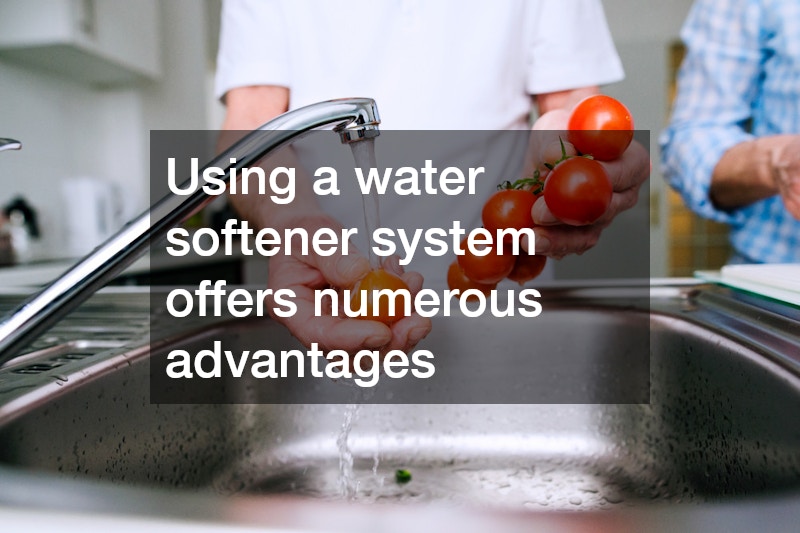Local water softener systems play an essential role in households around the world, particularly in regions plagued by hard water. The primary function of these systems is to remove minerals that cause water hardness, such as calcium and magnesium, improving both the quality of the water and the lifespan of plumbing and appliances. Understanding the operation and benefits of water softeners can help homeowners make informed decisions about their water treatment needs.
What is a Water Softener and How Does it Work
A water softener is a device designed to treat hard water, which is water that contains high levels of natural minerals like calcium and magnesium. These minerals can cause scaling in pipes, reduce the effectiveness of soaps, and leave residue on dishes and surfaces. Water softeners work by using a process called ion exchange, where calcium and magnesium ions in the water are replaced with sodium ions, resulting in softer water.
The key component of a water softener is the resin tank filled with tiny resin beads. When hard water flows through the tank, the calcium and magnesium ions are attracted to and held by the resin beads. In exchange, sodium ions from a brine solution are released into the water. This process effectively removes the hardness-causing minerals and provides the household with softened water.
Periodically, the system undergoes a regeneration process to recharge the resin beads with sodium ions. During regeneration, a strong brine solution is flushed through the resin tank, washing away the accumulated calcium and magnesium ions and replacing them with fresh sodium. This keeps the system functioning efficiently and ensures a continuous supply of softened water.
Why is Your Local Water Hard, and Do You Need a Softener
The hardness of your local water largely depends on the geological makeup of the region. Areas with high concentrations of limestone or chalk, for example, tend to have harder water because these rocks contain high amounts of calcium and magnesium. As rainwater flows through the ground, it dissolves these minerals, leading to the presence of hard water.
One common sign of hard water is noticeable mineral buildup on faucets and fixtures, as well as soap scum in sinks and bathtubs. Moreover, residents may experience diminished soap and shampoo lather, requiring more product to get an effective clean. These indicators suggest the presence of hard water and highlight the benefits of a water softener system in addressing these issues.
The need for a water softener also depends on personal preferences and the specific problems hard water creates in each household. For some, the inconvenience of mineral buildup and inefficient soap use can justify the investment in a water softener. Additionally, softer water can protect water-using appliances, reducing maintenance costs and prolonging their operational life.
How to Choose the Right Water Softener System for Your Home
Selecting the right water softener system depends on several key factors, starting with the hardness level of your local water supply. You can obtain this information through your local water utility or by using a water hardness test kit. Understanding the hardness level helps determine the capacity and type of system that would be most effective for your home.
Another critical aspect to consider is the size of the water softener, which should be based on the number of people in your household and your daily water usage. A system that’s too small may not handle the volume of water needed efficiently, whereas an oversized system could result in unnecessary operating costs. Calculating daily water usage can help you select the appropriate system size to meet your family’s needs.
Additional features, such as digital controls and demand-initiated regeneration, may also influence your decision. While these features can increase system cost, they offer convenience and can enhance system efficiency by optimizing water and salt usage. Evaluating your budget and desired outcomes will guide you in selecting the best water softener for your home.
What are the Benefits of Using a Water Softener System
Using a water softener system offers numerous advantages that enhance the quality of life in your home. One significant benefit is the prevention of mineral buildup in plumbing fixtures and pipes. By removing hardness-causing minerals from the water, a water softener mitigates scale deposits that can clog pipes and reduce water flow, saving you from costly plumbing repairs.
Softened water also improves the efficiency and longevity of water-using appliances like dishwashers, washing machines, and water heaters. Hard water can lead to scale buildup within these appliances, reducing their efficiency and increasing the likelihood of breakdowns. With softer water, appliances operate more efficiently and typically require fewer repairs, leading to lower maintenance costs over time.
Additionally, many individuals find that softened water enhances personal care and cleanliness. It allows soap and shampoo to lather more effectively, leading to better cleansing with less product. Skin and hair may feel softer without the residue left by hard water, contributing to a more pleasant bathing experience.
The significance of understanding and managing water softener systems cannot be overstated, particularly in areas affected by hard water. These systems play an invaluable role in preserving the efficiency and integrity of your plumbing and appliances while enhancing the overall quality of life. By selecting the right system and maintaining it properly, you can enjoy the numerous benefits that softened water provides and ensure the system’s efficiency for years to come.




